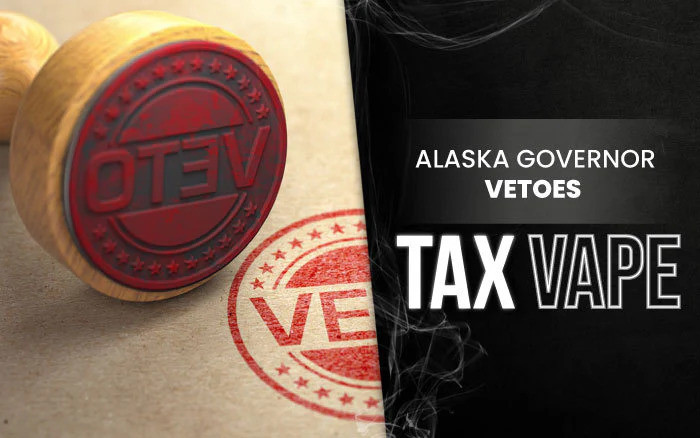Alaska Governor Vetoes Vape Tax
Estimated 0 min read
Mike Dunleavy is an American politician currently serving as the 12th governor of Alaska and was a member of the Alaska senate from 2013 to 2018. But why is Mike Dunleavy at the center of this article?
Well, it was Governor Dunleavy who vetoed Senate Bill 45, a bill proposing a 35% tax on wholesale vaping products in Alaska. This same bill first started at a proposed 45% raise, then was lowered to 25%, and finally arrived, and passed, at 35%.
The bill, passed in May 2022, was not only meant to impose a statewide tax on wholesale vape products but it was also written with the intention of stopping the USPS delivery of vape products and raising the minimum age to purchase tobacco products from 19 to 21 in Alaska.
However:
It seems clear that the tax portion of the bill prompted Governor Dunleavy’s veto. A higher vape tax would mean not sticking to his promise to voters of not raising taxes, which he then corroborated by stating that “a tax on the people of Alaska is not something that I could support”.
One of Governor Dunleavy’s main points of action is suppressing taxation increases as much as possible, and according to the governor’s official website, “Governor Dunleavy is committed to opening Alaska up to new business and investment.” We can only imagine this must include the vape industry, particularly after the bill was vetoed this past September.”
That said:
The Opposition is likely to come back with a different version of the bill next year and seems optimistic on it passing the next time around.
But there are strong arguments against a bill like this one. These arguments do not apply solely to Alaska. For instance, a Yale University study on the effects of tobacco taxes on smoking and vaping nicotine among the age group from 18-25 years old found that increasing taxes on nicotine vape products would in fact decrease the rate of daily vaping but it would also increase the rate of smoking by a significant percentage.
However:
It does have to be said that the same behavior was found in an alternative scenario where cigarette taxes would decrease smoking but increase daily vaping of nicotine products.
In conclusion:
Vaping and smoking rates seem to be tied to one another depending on taxation. But tax increases are not necessarily the best alternative to regulating the consumption of either product for this particular age group, given that lower consumption of one product could end in higher consumption of the other.
We believe further investigation is needed to arrive at a smart solution. One that we are yet to figure out. What we do know is that actions like the Alaska veto could paint a brighter future for the vaping tax and the vape industry in general.







